From washing dishes in the dining hall to shelving books in the library, Notre Dame students have filled part-time jobs on campus since the University’s early years.
In these jobs, many students learn skills they’ll put to future use — including how to balance school and work and commitments to friends and family. Some students take a job to earn extra cash and find that the work becomes one of their most important college experiences.
In 2021-22, 45 percent of Notre Dame undergraduates had part-time jobs on campus or with one of the University’s partner nonprofit agencies, according to the Office of Financial Aid — which doesn’t track the off-campus jobs that some students get on their own.
Last August, Notre Dame raised its minimum wage for student workers from $11 to $15 per hour, a consequence both of the nationwide worker shortage spurred by the coronavirus pandemic and of ongoing inflation.
Students find employment by browsing the University’s online student job board, where postings range from laboratory work to tutoring to off-campus child care. One recently sought robotics fulfillment technicians to maintain the University’s new food-delivery robots.
Notre Dame Magazine talked to some undergraduates about their part-time jobs and what they are learning from their work.
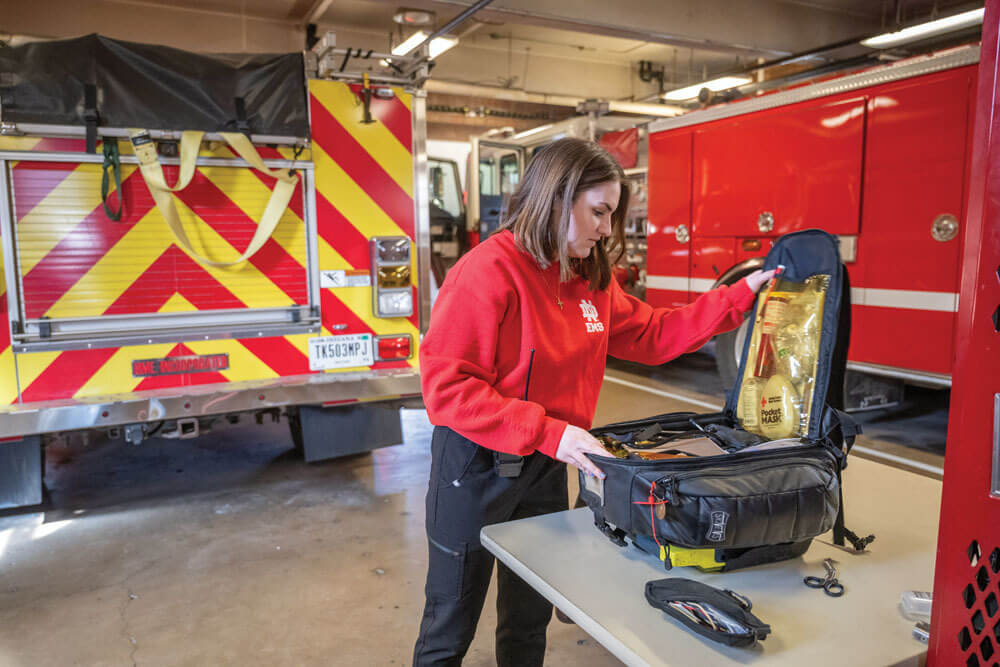
Nikki Iamonaco has treated bloody noses, possible concussions, skinned knees and sprained ankles. A junior science preprofessional major, she is among 14 student emergency medical technicians who work part time for the Notre Dame Fire Department.
Iamonaco completed 10 weeks of training and passed a test in 2021 to serve as an EMT, a health professional certified to provide emergency medical services. She saw working as an EMT as a good way to gain clinical experience. “It’s pretty standard to have at least 500 clinical hours before applying to medical school,” she says.
After she was certified, she discovered that the campus fire department hires student EMTs to work club sport practices, competitions and other events. She works about six hours a week, usually at boxing bouts and rugby, field hockey, lacrosse and club football games.
During varsity football games, she and another EMT drive a golf cart around the Notre Dame Stadium concourse to provide medical assistance for fans experiencing fainting, dehydration, falls or more serious health emergencies. When necessary, EMTs transport individuals to one of four first-aid stations where doctors and nurses are available.
“Those were my most rewarding shifts. I loved working football games. I learned so much and it was super fast-paced,” Iamonaco says.
The job introduced her to other pre-med students who, as upperclassmen, offered her advice about internships, research opportunities and classes.
She’s been able to apply skills she’s learning in her compassionate care course, such as lightly touching a person’s shoulder before treating an injury. “I’ve learned a lot about myself, like how I respond in very stressful situations,” Iamonaco says. “I can respond well and compassionately and get the job done.”
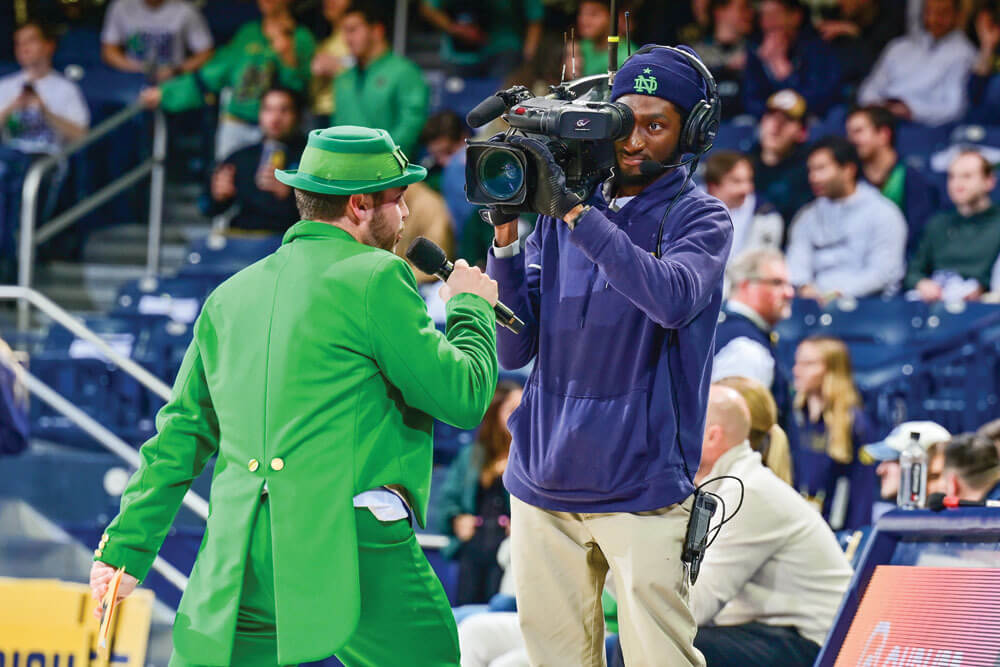
Daniel McFarlane started work at Notre Dame Studios as a freshman, with no prior video or media experience. “I thought it would be a fun opportunity. Something that was cool,” says the senior computer science and psychology major.
He spent his first shift shadowing another employee who was shooting video at a varsity volleyball game. On his next shift, McFarlane operated the camera for the livestream of a men’s soccer match. “You learned as you made some mistakes,” he says.
He’s now a student media specialist for Fighting Irish Media, working about 10 hours a week. FIM is a sports video production unit that produces live and streaming broadcasts, social media videos and videoboard shows during varsity sports events. FIM and Notre Dame Studios work in partnership to recruit, train and employ students for assignments that include editing, producing, designing graphics, operating cameras and audio, announcing and related skills.
“Most students come to us with little or no experience,” says Callee Stirn ’18, student program coordinator at Notre Dame Studios. Student employees typically work five to 20 hours a week, and the program employs about 150 students a semester. Some are film or television students, but most are not.
McFarlane has worked as a graphics operator, audio coordinator, scoreboard operator, director and producer at soccer, basketball and lacrosse matches, as well as track and field and boxing events.
At football games, he walked through the stands with a video camera and captured crowd scenes, which were broadcast live on the stadium’s videoboard and occasionally on NBC. He loved that experience.
The job also provides McFarlane chances to shoot video of classroom lectures, visiting speakers and events at DeBartolo Performing Arts Center. He enjoys the challenge of staffing events solo, setting up and operating the camera and audio feed by himself. “I’m a one-man show. I think those are my favorite shifts. You have to problem-solve to get it done,” he says.
Now he trains new hires and helps teach a class on technical directing. He’s made good friends along the way. He worked two summer internships at NBCUniversal, and he’ll join that company full time after graduation.
“This has been one of the foundations of my college experience. Besides academics, I spent the bulk of my time working here,” McFarlane says. “I had so much fun here that I decided to keep going down this road after college.”
“I might have the happiest job on campus,” says senior psychology major Piper Shine. As an employee of the Notre Dame Cake Service, Shine boards a golf cart several times a week and delivers personalized cakes to students and others to mark birthdays and other special occasions.
The treats, usually ordered by parents, are hand-delivered. Headquartered in LaFortune Student Center, the service also offers balloons, cookies, cupcakes and other items. A typical day involves about seven deliveries, but the unit gets extra busy around Christmas, St. Patrick’s Day and other holidays. “I think the most deliveries I’ve done in one day is 21,” Shine says.
Beside deliveries, Shine replies to online customers and places orders with a local bakery. She enjoys the work because it involves brightening people’s days. “It’s not your run-of-the-mill campus job,” she says.
She’s developed customer service and phone skills and made good friends. “It’s a small, intimate little community that I never really expected to find here at Notre Dame. It’s been a cool gift.”
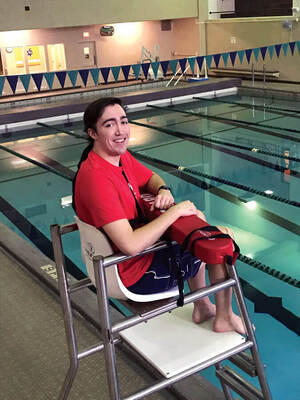
As a lifeguard for the University’s RecSports division, senior John Daly sits on a tall chair next to the pool in the Rockne Memorial gymnasium and watches swimmers complete their laps. The Rockne pool is used mainly for fitness swimming by students and employees. Daly’s had the job for two years now.
A neuroscience major, Daly became a certified lifeguard while working at a summer camp after his sophomore year. The three or four hours he works per week will count as clinical hours when he applies to medical school.
Besides his shifts at the Rock, he also lifeguards at the Rolfs Aquatics Center and for sailing events on St. Joseph’s Lake, and he serves as a CPR instructor. One of dozens of certified lifeguards on campus, Daly says the job has given him the chance to get to know students from a wide variety of majors.
“Entering college, I was a very shy person,” he says. Lifeguarding has been “a good opportunity for personal growth.”
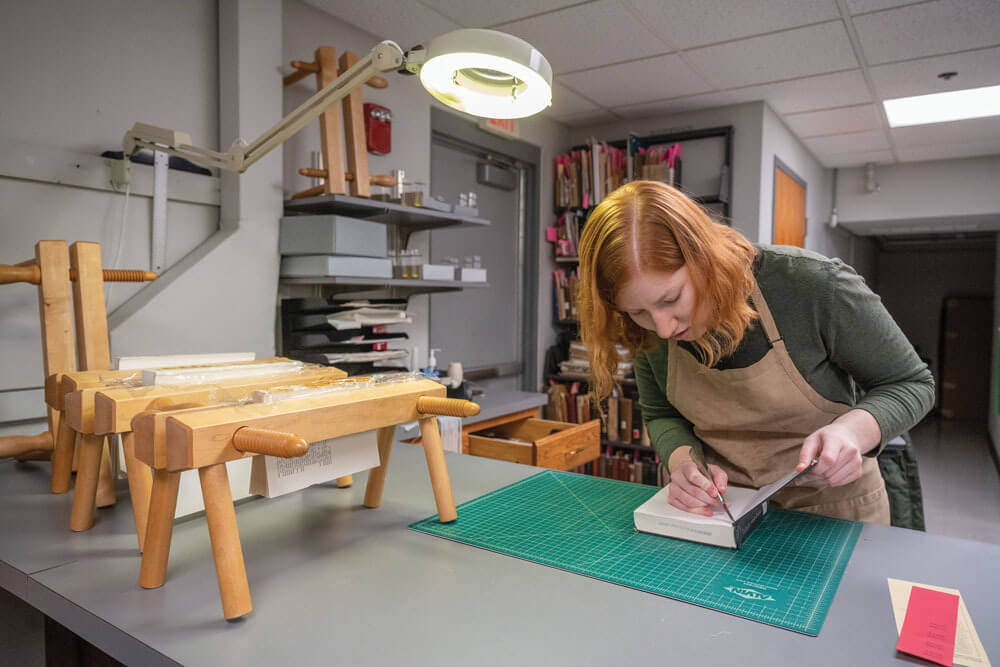
Using paper, cardboard, adhesive, wax and other materials, junior Megan Sherry carefully repairs books, maps, sheet music and other library materials. It’s a meticulous, hands-on job that takes place in the basement of a laboratory building north of campus. Sherry, a classics and psychology major, is a part-time conservation assistant in the Hesburgh Libraries’ Analog Preservation and Conservation unit.
Sometimes the task requires soaking the spine of a book in a water-reversible adhesive. Repairs may involve replacing end sheets, placing new covers or spines, or creating sturdy boxes to protect fragile printed materials. Volumes undergoing repair are placed in presses to make sure the pages and bindings remain even.
Sherry had no prior experience in book conservation, but she’s come to relish the work over her two years on the job. She enjoys the quiet, tactile, meditative nature of the work. So many tasks facing college students today involve reading, writing and analyzing on computer screens, but book repair is different, she says. “I like it because it’s a break from schoolwork but it’s still work. I get to work with my hands. I find it satisfying to be able to see what I’m doing.”
Now she’s considering a career in museum or library work. As a lifelong reader and book lover, she says the job is a good fit. “There are so many books I’ll never have the time to read, but I get to work with them,” she says.
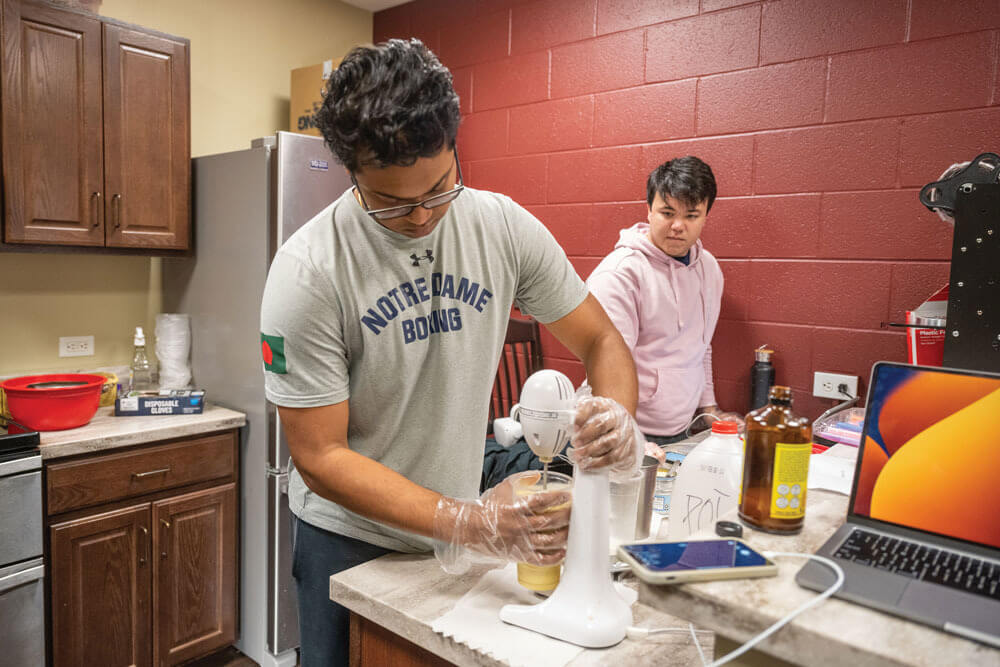

Four evenings a week, Jon Brockett and Nick Karakunnel open their business, Pearls on Tap, which makes and sells bubble teas from the kitchen of Keough Hall. Their customers come from all over campus and include orders placed in advance.
Bubble tea, also known as boba tea, is a popular cold drink made with a tea base shaken with flavorings, sweeteners, milk and large tapioca pearls. Brockett, a computer science major, and Karakunnel, a finance major and Keough resident, co-founded the business in 2022. They charge $4 for 24-ounce boba drinks in several flavors. For an extra fee, they’ll deliver.
They market the business primarily through word-of-mouth and social media. Customer turnout varies. Some evenings, a few trickle in the door. Other evenings, bulk orders are placed for dozens of beverages to serve at club events.
Karakunnel and Brockett split the profits among themselves and Keough, but the two young men didn’t launch Pearls on Tap expecting to earn a fortune. Based on the 25 or 30 hours they put into it each week, they estimate they make the federal minimum wage. Rather, they started the service for the experience and for fun. Within three days of opening, they were selling out their stock.
“It’s helped me to grow,” Karakunnel says. “It’s forced me to do things that are a little outside my comfort zone,” like getting up at 6 a.m. some days to make sure supplies are in stock and the business is ready for that evening.
“It’s helped me with time management. It’s a huge time commitment,” Brockett says. “I need to make sure my time is used wisely.”
Senior Ellie Temeles works for ND Listens, a University phone bank, and considers it one of the most important experiences of her undergraduate career. On the staff for three years, she’s now a manager who helps train new workers.
The students make telephone calls to alumni, parents and friends of the University to talk — and to listen — but not to request donations. About 100 students work for the service.
The phone bank is designed to engage students with the broader Notre Dame community and build stronger bonds with alumni, parents and others. The students call to wish happy birthdays, thank donors for gifts or just say hello to alumni. They also call married alumni couples before Valentine’s Day to offer best wishes.
People reached by phone often want to continue the conversation, recounting memories of their own undergraduate years and asking questions about what student life is like these days.
Temeles admits it was intimidating initially to make cold calls to strangers, but she soon looked forward to her shifts. “You meet people who just want to chat about life. It’s really fun to hear about their experiences,” the neuroscience major says. A call may take a few minutes, but Temeles’ longest conversation lasted three hours. “It’s a job I love going to,” she says.
She recalls having a challenging freshman year, but joining ND Listens the next fall was a turning point. She has made close friends while becoming deeply committed to the University’s mission. “Through my conversations with alumni and friends of the University, I began to realize how special a place Notre Dame really is,” she says. “The calls at ND Listens built my pride in being here.”
Sophomore Dot Crumlish started working in the Innovation Lab at Notre Dame’s IDEA Center before she was a freshman. Already experienced in computer-aided design, she landed a summer job that she’s continuing part time as a student.
The Innovation Lab offers expertise and machines to help students, employees and community residents rapidly prototype and manufacture things. Assistance is available in computer-aided design, graphic design, laser cutting, woodworking and 3-D printing.
“I think there’s a lot you learn outside the classroom working in the Innovation Lab, especially engineering,” Crumlish says. “The classroom is a very controlled environment, and there’s not a lot that can go wrong. You don’t really learn how much things can go wrong until you’re working in the real world,” she says.
The lab has taught the mechanical engineering major how to work with clients, craft prototypes and pivot when a project goes awry. “There are things you don’t think about until the prototype is in your hands,” she says. “It makes a lot more sense when you can physically see it.”
She works 10 to 15 hours a week. Her duties include assembling prototypes and working with community residents who have ideas for inventions. It might be anything: a device to make an existing machine perform a new function or an innovation for the home. “Those are my favorite projects to work on, because you get to work with people who aren’t just your peers,” she says.
A client might arrive with a rough sketch on paper. “They need help getting to the next step — a prototype that is ready for manufacturing,” she says. “We help them make their dream a reality.”
Crumlish says her lab job is as valuable as what she is learning in the classroom. She enjoys working at the intersection of engineering and design. She could see herself working in a place like the Innovation Lab after college.
Friends “think I just come here and play with toys all day,” she says. “I can make things on my own in our free time. I can tinker.” She keeps a notebook of her ideas for future projects.
Many students fill traditional part-time jobs at Notre Dame such as serving food at campus eateries, setting up rooms for events, clerking at the Huddle Mart in LaFortune or delivering mail. Some undergrads seek out desk jobs in offices or computer labs so they can do homework when things are slow. The most fortunate, though, land jobs that teach them something about themselves and prepare them for the future.
Margaret Fosmoe is an associate editor of this magazine. Contact her at mfosmoe@nd.edu or @mfosmoe.